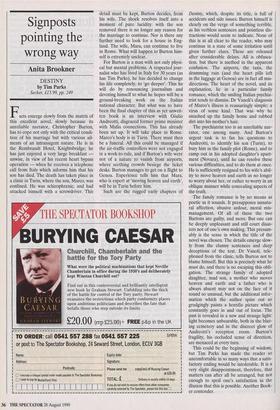Signposts pointing the wrong way
Anita Brookner
DESTINY by Tim Parks
Secker, £15.99, pp. 249 Facts emerge slowly from the matrix of this excellent novel, slowly because its unreliable narrator, Christopher Burton, has to cope not only with the critical condi- tion of his marriage but with various ail- ments of an intransigent nature. He is in the Rembrandt Hotel, Knightsbridge; he has just enjoyed a very large breakfast unwise, in view of his recent heart bypass operation — when he receives a telephone call from Italy which informs him that his son has died. The death has taken place in a clinic in Turin, where the son, Marco, was confined. He was schizophrenic, and had attacked himself with a screwdriver. This detail must be kept, Burton decides, from his wife. The shock resolves itself into a moment of pure lucidity: with the son removed there is no longer any reason for the marriage to continue. Nor is there any further need to look for a house in Eng- land. The wife, Mara, can continue to live in Rome. What will happen to Burton him- self is extremely unclear.
For Burton is a man with not only physi- cal but mental problems. A respected jour- nalist who has lived in Italy for 30 years (as has Tim Parks), he has decided to change his life completely, to 'go deeper'. This he will do by renouncing journalism and devoting himself to what he hopes will be a ground-breaking work on the Italian national character. But what was to have been the final chapter of this as yet unwrit- ten book is an interview with Giulio Andreotti, disgraced former prime minister with Mafia connections. This has already been set up. It will take place in Rome. Marco's body is in Turin. There must then be a funeral. All this could be managed if the air-traffic controllers were not engaged in a work-to-rule, and if Burton's wife were not of a nature to vanish from airports, where seething crowds besiege the ticket desks. Burton manages to get on a flight to Genoa. Experience tells him that Mara, who is expert at 'moving heaven and earth', will be in Turin before him.
Such are the rugged early chapters of Destiny, which, despite its title, is full of accidents and side issues. Burton himself is clearly on the verge of something terrible, as his verbless sentences and pointless dis- tractions would seem to indicate. None of this is at all clear to the reader, who may continue in a state of some irritation until given further clues. These are released after considerable delays. All is obfusca- tion, but there is method in the apparent confusion. The airports, the taxis, the drumming rain (and the heart pills left in the luggage at Genoa) are in fact all mis- directions. The heart of the novel, and its explanation, lie in a particular family romance, which the smiling Italian psychia- trist tends to dismiss. Dr Vanoli's diagnosis of Marco's illness is reassuringly simple: a virus of some kind. That was why he smashed up the family home and rubbed dirt into his mother's hair.
The psychiatrist too is an unreliable nar- rator, one among many. And Burton's urgent task is to fax his questions to Andreotti, to identify his son (Turin), to bury him in the family plot (Rome), and to camp out in his adopted daughter's apart- ment (Novara), until he can resolve these various difficulties, and to do them at once. He is sufficiently resigned to his wife's abil- ity to move heaven and earth as no longer to worry about her, or rather to worry in an oblique manner while concealing aspects of the truth.
The family romance is by no means as poetic as it sounds. It presupposes unnatu- ral affection, abusive ardour, moral mis- management. Of all of these the two Burtons are guilty, and more. But one can be deeply unpleasant and still court disas- ters not of one's own making. This presum- ably is the sense in which the title of the novel was chosen. The details emerge slow- ly from the clumsy sentences and deep deceptions of the text. Dr Vanoli, tele- phoned from the clinic, tells Burton not to blame himself. But this is precisely what he must do, and there is no escaping this obli- gation. The strange family of adopted daughter, mad son, a mother who moves heaven and earth and a father who is always absent may not on the face of it sound so unusual, but the additional infor- mation which the author spins out so grudgingly paints a horrific picture which constantly goes in and out of focus. The past is revealed in a new and strange light: light becomes unbearable, both in the blaz- ing cemetery and in the discreet glow of Andreotti's reception room. Burton's fragility, his occluded sense of direction, are menaced at every turn.
This could be the beginning of wisdom, but Tim Parks has made the reader so uncomfortable in so many ways that a satis- factory ending would be intolerable. It is a very slight disappointment, therefore, that matters can after all be arranged, but not enough to spoil one's satisfaction in the illusion that this is possible. Another Book- er contender.


























































 Previous page
Previous page